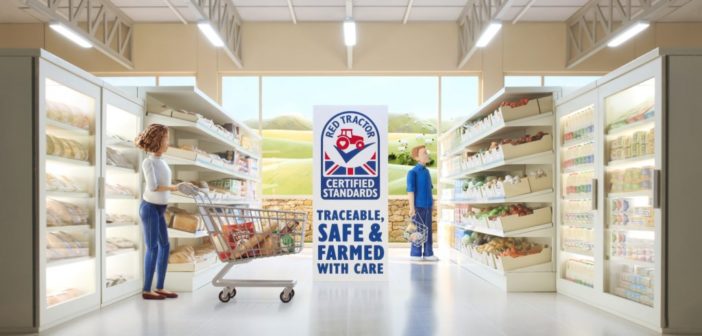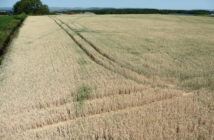- Standards agreed following the scheme’s biggest ever consultation
- Revised standards apply from 1 November 2021
- Full details of changes to be rolled out to members in Augus
Red Tractor, the UK’s largest and most comprehensive food assurance scheme, has shared how it has listened to feedback and outlined what is changing in its revised farm standards from November.
This year for the first time in its history, Red Tractor opened the process to its 46,000 members and the entire food supply chain, making it the biggest and most transparent consultation ever.
The proposals sought to engage as many people as possible across the Red Tractor supply chain to streamline standards, comply with legislation, meet changes in consumer demand, and provide clarity for both farmers and their assessors.
The consultation followed a rigorous three-staged process adhering to the gold standard recommendations of the British Standards Institute – committee, consultation and consensus.
Over 3,000 pieces of feedback were fed into the technical advisory committees and sectors boards for consensus, before being agreed by the main Red Tractor board. This differentiated our approach and saw certain proposals dropped, while others were simplified and clarified.
Some new standards have been added because of legislation change, such as an amendment to vermin control standards to comply with food safety law, or industry commitments to improving animal welfare, including the wider dairy sector’s pledge to eliminate the routine euthanasia of calves by 2023.
The industry spoke and we listened

Jim Moseley
Red Tractor’s CEO Jim Moseley said: “We set out to hear from all stakeholders and to engage as much of the farming community as possible, and I’m delighted by the amount of feedback that was generated by the review. This has been enormously helpful for informing the work to finalise the new version of the standards.
“Our standards need to achieve two key objectives – first to meet the needs of consumers who expect high standards but shop keenly on price, and second to provide farmers and the supply chain with manageable standards. Getting that balance right then also satisfies the needs of food businesses and government.
“With its structures of sector boards and technical committees, and through the comprehensive feedback of the consultation, Red Tractor is in a fortunate position to achieve that crucial balance that benefits the UK food supply chain.”
Key combinable crops & sugar beet scheme changes
REMOVED A requirement to leave livestock buildings for five weeks between cleaning them and using them to store grain.
SIMPLIFIED Grain trailer ID needs to be clearly identifiable and on at least the rear and one side of the trailer, rather than all three sides as currently required. Trailer ID is only necessary when transporting your grain into a third-party intake.
NEW All farms with workers must have a written Health and Safety policy – this is a slight advance on the legal baseline which only applies to businesses with more than five employees. Given high fatality figures in the industry Red Tractor believes it is essential to check policies are in place and communicated to workers.
REVISED Many of the requirements of vermin control standards align with the Campaign for Responsible Rodenticide Use (CRRU) Code of Practice which aims to minimise the exposure of wildlife to toxic rodenticides. This means that Red Tractor members can continue to buy rodenticide that they would otherwise be prohibited from purchasing without completing additional training.
CLARIFIED Moisture meter calibration can be carried out on farm using reference samples.
FRESH PRODUCE
- REVISED strengthened and upgraded approach to field/production site risk assessment to better manage risks from historic and adjacent activities.
- New protected Cropping section introduced with content relevant to established, protected growing environments (e.g. greenhouse) and new crop production systems (e.g. vertical farms).
- Revised strengthened and consistent expectations for pesticide residue testing.
- New record keeping systems for introduction of biological controls.
Matt Culley, NFU crops board chairman said: “It was important that Red Tractor listened to our sectors’ concerns during the consultation, and the impact the proposals could have on businesses. The combinable crops sector already faces numerous challenges and is undergoing considerable change.
“NFU representatives on the crops sector technical advisory committee worked extremely hard with industry stakeholders to ensure that the development of these standards took into account the views of our members and growers, and continued to demonstrated the value of Red Tractor to the whole supply chain.”
Guy Smith, Red Tractor crops and sugar beet sector board chair, said: “Aside from some minor technical changes and some removals, the only substantive change in the version 5 Red Tractor audit for arable farmers is the requirement to show a Health & Safety policy to the auditor.
“Given that having such a policy is a legal requirement and given the latest appalling figures for deaths on farms we have seen this week, I think it only right we should add this check to the audit.”
Stuart Roberts, NFU deputy president, said: “It has never been more important for British agriculture to be in tune with the public. Following feedback from the NFU and farmer and grower licensees, Red Tractor has developed the right standards to progress our industry, while balancing the needs of farmers with the evolving demands of shoppers and the supply chain.
“Going forward I would like to see Red Tractor embrace the eight principles that NFU has set out for future standards development.”
Bolt-on modules
While changes to Red Tractor’s core standards mean members keep pace with mainstream market demands, there are some end-users who will require farmers and growers to demonstrate their business credentials on the important issues of worker welfare and sustainability.
In response to feedback during the consultation, Red Tractor will develop optional modules in these areas which bolt on to the core standards. Further information on how the modules will be developed and when they will be launched, will be available next year.
Jim Moseley added: “One of the key themes from the review was the appeal for Red Tractor to provide some flexibility within the schemes.
“This proposed approach will deliver the right standards across the supply chain which could deliver even greater market access for our farmer members with minimal impact on the audit burden. We will continue to work with our supply chain customers to explore how this could be delivered effectively.”
Andrew Opie, British Retail Consortium chief executive, said: “Customers trust us to make sure the food that gets to their plate has been produced to the high standards they expect. This fifth standards review has given us another opportunity to listen widely to everyone’s viewpoint. It is important the standards don’t stand still, and we look forward to more progress on climate change and ethical labour over the next few years.”




